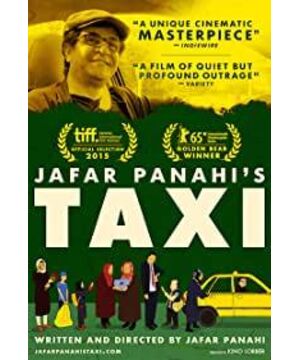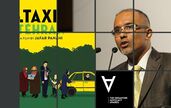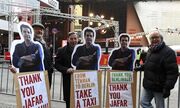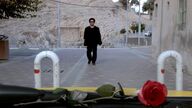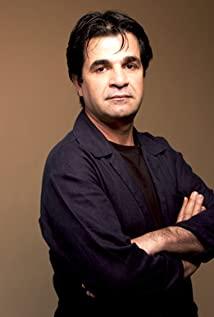During the whole process of watching "Taxi", there seemed to be a question mark in my heart. Is this a movie or a documentary? Or back to the most essential dualism question, is this true or false?
The scene of the story begins with a taxi that starts slowly. Director Jaffa Panasi drove this taxi through the streets and alleys of Tehran. Passengers boarded and got off one after another. The picture of Iran’s life was staged in this small taxi. : There are ruffians who blew themselves up as bandits; there are female teachers; there are hawkers who want to cooperate with the director to sell illegal CDs; there are men who have been in a car accident and believe that they are about to die, need to record their last words, and leave all their property to their wives ; There are old people who firmly believe that if they don’t put goldfish in the holy spring water before 12 noon, they will die; there is Panasi’s own niece who wants to make a movie that can be “released”...
and these As the passengers went up and down, the problem seemed to sway on both sides of the balance: real or fake.
The film’s lens is very clever. This lens seems to be fixed under the front windshield, hidden in some way, and the driver Panasi will turn the lens around as needed. Due to the limitation of this shot, the director will cleverly use other people's shooting tools to switch perspectives: For example, when recording a man's last words, you can shoot from the co-pilot's perspective, such as the camera in the hands of a little niece, these perspectives The truthfulness of the movie also keeps people wondering whether the director really drove the camera, drove a taxi, and filmed a documentary like a reality show without a script.
Because the film is set in the small space of a taxi, the story is destined not to be turbulent; therefore, the most powerful element in the film is language, which is like chattering. Telling stories in words alone is difficult in itself. The power of rhetoric is always not as moving as bloody, violent or emotional stories. So no matter who told the story, it always seemed a little dry. I have to admit that such an uncomfortable way of telling stories is quite flavorful by director Panasi.
The topic first started with ordinary people’s firewood, rice, oil and salt, to social issues, to beliefs. If the film from beginning to end is just like a kaleidoscope of black humor mixed with Iranian life, then the story itself will be like the angle of the camera erection, the ordinary power is minimal, but shocking. Unfortunately, after the burst of laughter, every once in a while, the topic will always be dragged back to the topic of the movie.
Jaffa Panasi’s films were banned from being shown in Iran because they violated the Iranian authorities. He himself was sentenced to 6 years’ imprisonment and banned from filming for 20 years. He was charged with "crime of endangering national security and participating in opposition to Iran." Propaganda activities of the revolutionary system". After being oppressed by the authorities, and after being treated unfairly, in the works shot, there is always a bit of unconcealable desire to appeal, and he is eager to tell the world that he has been wronged. If it’s a little girl, from the notebook a little bit of the teacher gave them the guidelines for how to make a movie, it sounds like Iran’s “State Administration of Radio, Film and Television” set the rules, we seem to realize it suddenly, oh, this is still It was derived from the director, this is "fake", and the real has become a fake.
Just as every director is the god of every work and determines the ups and downs of the small world of each work, Panasi controls the steering wheel of this "Taxi" and at the same time controls the direction of the whole story. Panasi sat in the driver's seat, with a kind smile on his face throughout the movie. Although complaints about reality came out of others in this way, and somewhat deliberately, I was still moved by his compassionate Buddha-like smile. Perhaps this is the most calm answer that an artist who has experienced suppression, experienced prison, and is not tolerated by his motherland can make.
Jaffa Panasi made a movie in 2011 called "This Isn't a Movie", I think if this "Taxi" has another name, it might be called "This Isn't a Movie either".
When he reached the realm of Da Che Da Enlightenment, he was very close, only that little bit short of it.
View more about Taxi reviews


